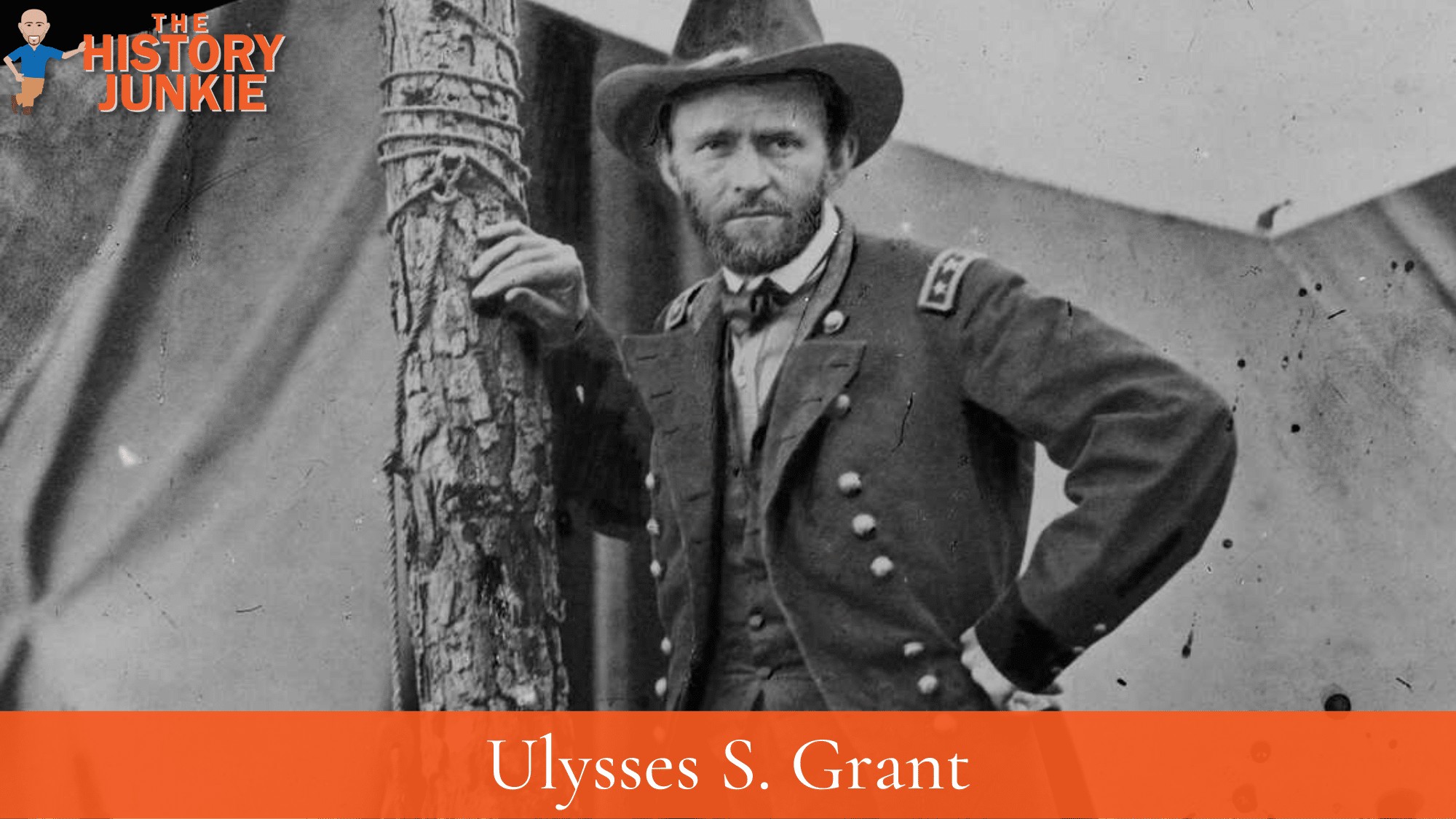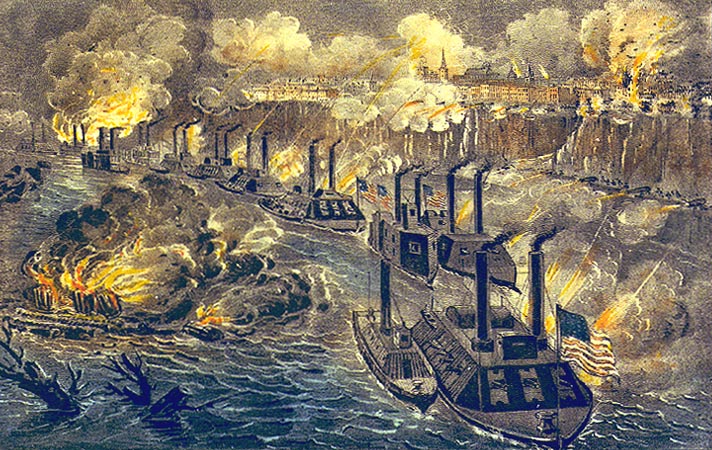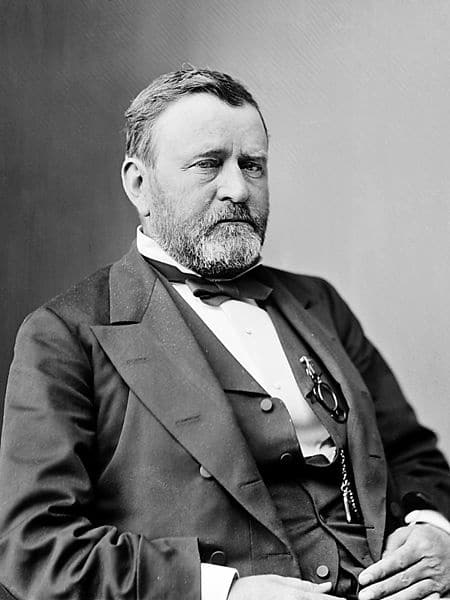President Ulysses S. Grant was the man who finally gave Abraham Lincoln what he needed in a general. Unlike George McClellan, George Meade, Ambrose Burnside, and others, Grant was not afraid to use his advantages.

Read Article: Famous Civil War Generals
He saw success in the Vicksburg Campaign, which effectively cut the Confederacy in half, and when he was promoted to general in the east, he wasted little time in going to work on Lee.
As successful as he was in the Civil War, that is not how it always was for him. He had to earn his way to the top.
Biography
This biography comes from Stan Klos:
was born on April 27, 1822, in a two-room log cabin in Point Pleasant in southwestern Ohio. His father, Jesse Root Grant, born January 23, 1794, near Greensburg, Pennsylvania, was a tanner and made a great deal of money.
His mother, Hannah Simpson Grant, was born November 23, 1798, in Montgomery, Pennsylvania. He was born Hiram Ulysses Grant and became known as Ulysses Simpson Grant when U. S. Congressman Thomas L. Hammer of Ohio mistakenly erred on his application in securing Grant admission to the U.S. Military Academy at West Point in 1839.
Growing up, Grant was the son of a frontier family living in Georgetown, Ohio. He worked on his father’s farm but was not fond of the work in his father’s tannery, choosing to do anything else.
At eight and a half years, he became a regular driver, using his father’s team to haul wood, and at ten, he drove a pair of horses to Cincinnati to bring back a load of passengers. He excelled at horsemanship and mathematics at West Point, but when he graduated in 1843, he was 21st in a class of 39.
He was assigned to infantry duty on the southwestern frontier, and for two years, he served in various posts in Missouri and Louisiana. While in Missouri, Grant met Julia Dent, the sister of a West Point classmate, whose family had a plantation near St. Louis.
When he left, he gave her his school ring, and the two were married four years later, on August 22, 1848. They had four children, three boys and a girl, and were a very devoted couple throughout their lives together.
Grant fought in the Mexican War (1846-1848) during the Polk Administration but had little heart for the campaign. Grant served at army posts in Detroit, Michigan, and Sackets Harbor, New York. In 1852, he was transferred to the Pacific Coast, and this duty left him homesick and isolated and missing his young family.
He grew morose and started drinking heavily, and he quarreled with his commander. Two months later, he was made to resign, having reached the rank of captain. In August 1854, he returned to Missouri and started working a 60-acre farm near St. Louis that his father-in-law had given to Julia.
He built a home, sells wood in St. Louis, and unable to turn a profit, he was forced to pawn his pocket watch and chain in 1857 to buy his family Christmas presents. In 1858, he entered a real estate and property management business partnership with one of Julia’s cousins.
This, too, did not work out as he was incapable of collecting the back due rent and was frequently late for work. He moved his family to Galena, Illinois, and accepted a job as a clerk in his brother’s leather shop, living comfortably in a snug house overlooking a cemetery.
At about this time, the Civil War broke out, and Grant applied to serve as an officer when a call for troops went out.
On June 17, 1861, Grant was appointed a Colonel of the 21st Illinois Infantry, and in August, he was appointed Brigadier General.
His first engagement as a General was the Battle of Belmont, Missouri, and three months later, aided by Commodore Andrew H. Foote, he captured Fort Donelson and Fort Henry. These were the first major Union victories of the war. The victory won Grant a promotion to Major General volunteer.
Two months later, in April 1862, the Battle of Shiloh caught Grant unaware of a Confederate attack as he waited for General Buell and the Army of the Ohio.
He had not fortified his position, and his forces suffered severe losses before Buell arrived and turned back the attack.
In the fall of 1862, Grant began planning the drive on Vicksburg, Mississippi, the Confederate stronghold that would be one of his greatest military successes. On July 4, 1863, after a siege lasting months, Confederate General John C. Pemberton surrendered his 30,000 men to Grant.
The same day, the Union victory at Gettysburg, Pennsylvania, brought great joy to the North. Grant was made a Major General in the regular army.
During the summer of 1863, Grant was recovering from a fall from his horse and spent his time with his family in a house near Vicksburg.

He was bedridden for weeks and was on crutches until mid-fall. On October 22, 1863, he took command at Chattanooga, Tennessee, and was victorious in the Battle of Chattanooga, forcing the Confederates to retreat into Tennessee.
In March of 1864, he received his commission as Lieutenant General from President Lincoln, and on March 12, he was appointed General in Chief of all United States Armies.
From the middle of June 1864 until early April 1865, Grant besieged Petersburg, the railroad and supply link between Richmond and the rest of the South. He cut Lee’s transportation lines and sent out flanking expeditions against Southern forces. Grant slowly starved out Lee’s men, and on April 9, 1865, Lee surrendered to Grant in the McLean House in Appomattox, Virginia.
When the Union soldiers got too impassioned, Grant showed his great decency and delicately quieted them, saying, “The war is over, the Rebels are again our countrymen, and the best sign of rejoicing is to abstain from all demonstrations in the field.”
In his memoirs, Grant said that he felt no exultation on the surrender; rather, he felt sad and depressed for the foe that had suffered so much for a cause.
Grant is mentioned on several occasions in Col. Stephen Russell Clark's letters to his wife, Del. It appears they were side by side during the besiege of Petersburg and the surrendering of Lee at the Appomattox as Col. Clark was with the Ohio 13th O.V.C.
In 1866, Grant was given the grade of full general, a rank held only by George Washington previously. He supervised the demobilization of the army, and he administered the reconstruction of the South.
Because of his great popularity as a war hero, Grant launched a career in politics, and on May 21, 1868, the Republican National Convention that was meeting in Chicago nominated him as a candidate for President.
He was unanimously nominated, with House Speaker Schuyler Colfax as his running mate. Grant did no active campaigning and easily won the presidency, receiving 214 electoral votes to his opponent’s 80.
However, the war hero proved a poor chief executive, filling many government posts with corrupt or incompetent relatives and friends. Although personally honest, he drew criticism for accepting expensive gifts, and his two terms as President were plagued by scandals.
However, the president remained loyal to his friends, almost regardless of what their conduct had been or how seriously they had damaged his reputation.
His followers planned to nominate him for a third term in 1876, but the leaders of the Republican Party opposed his re-nomination. Grant left office in Match 1877 with a few thousand dollars saved and a desire to see the world.
On May 17, he sailed with his family on the first leg of an around-the-world journey. He was well received everywhere, not as the former president of the United States, but as the Civil War hero.
After two years of travel, he returned home, and in June 1880, he was unsuccessful in securing the Republican nomination for President. It is difficult to know whether he actually coveted the Presidency again, though his wife, Julia, certainly wanted to return to the White House. His friends and sons were convinced he didn't care, and the evidence shows they were correct.
On December 24, 1883, Grant slipped on the pavement outside his home while handing a cab driver a $20 bill. He falls heavily on his side and suffers a serious injury to his hip, remaining bedridden for weeks and walking with a cane or crutches for the rest of his life.
The brokerage firm that he had invested in failed in May 1884, and Grant lost his family’s fortune, begging for a personal loan from William Vanderbilt, which he eventually repaid with his war trophies and uniforms.
The failure plunged Grant into a prolonged depression, and in September, he was diagnosed with cancer in the throat. The cancer spreads, and he is only able to swallow liquids in small portions; the pain is unbearable, but he works on his Memoirs in an effort to provide for his family after his death.
He finishes his Memoirs on July 19, 1885; by this time, he is down to 120 pounds and is so weak he sometimes falls from his chair.
At 8:06 a.m. on July 23, 1885, Grant dies, surrounded by his family and physicians. His Memoirs sell over 300,000 copies and earn Julia a staggering $450,000.

Family Overview
Ulysses S. Grant has an ancestor who came over on the Mayflower and helped found Plymouth Colony.
The ancestor is Richard Warren, who came over and signed the Mayflower Compact.
He was originally born Hiram Ulysses Grant, but a mistake in his West Point paperwork gave him the name Ulysses S. Grant, which he kept for the rest of his life.
He married his wife Julie, who many said was a plain woman, but Grant adored her, and they had four children who lived until adulthood.
There is an enormous amount written about his life, but his memoirs are probably the best resource.
Family Tree Chart
Parents:
Jesse Root Grant (1794 - 1873) - At various times throughout his life, he worked as a farmer, tanner, merchant, Mayor of Georgetown, Ohio, 1837 to 1839, Mayor of Bethel, Ohio, 1851, and Postmaster in Covington, Kentucky. He proved very successful in his business ventures and owned leather goods stores in Bethel, Ohio, Covington, Kentucky, and Galena, Illinois.
Hannah Simpson (1798 - 1883) - She rarely discussed her son with anyone while he was a general and a president, especially not the press. She was a devoutly religious woman, always reserved and unpretentious in her manner, and she is often considered by historians and others to have had a strong influence on her son Ulysses, who shared similar qualities in character.
Spouse:
Julie Boggs Dent (1826 - 1902) - She and her husband had a fantastic relationship. She was cross-eyed and had imperfections, but Grant never minded, and when she thought about having surgery to correct her eyes, he pushed back and said he liked her eyes the way they were. The couple went on to have 4 children.
Children:
Frederick Dent Grant (1850 - 1912) - He attended West Point Academy from 1866 to graduation in 1871. Frederick worked as a Civil Engineer for the Union Pacific Railroad before returning to the Army in 1872. He was promoted to Lieutenant Colonel in 1873 and served on the staff of General Philip Sheridan. He returned home for the birth of his firstborn son, which probably saved his life because, during that time period, the Battle of Little Big Horn took place.
Ulysses Simpson Grant Jr. (1852 - 1929) - He worked as private secretary to his father in the White House for over a year before accepting the post of assistant United States attorney for the Southern District of New York. He moved to San Diego, California, for his wife's health and would become a leading citizen in the city.
Ellen Wrenshall Grant (1855 - 1922) - She lived the first two years of her life in a log cabin called Hardscrabble, which was built by her father. She was thirteen when her father became the 18th President of the United States. She met and married at 18. She would have four children.
Jesse Root Grant (1858 - 1934) - He was six years old when he traveled with his mother to his father's headquarters during the Civil War. He had a front-row seat for the final year of the war. He was a bit of a rebel and seemed rootless due to moving so much. He and his wife divorced, and he remarried. He wrote a book about his father and was successful in real estate.
Siblings:
Samuel Simpson Grant (1825 - 1861) - He was the oldest brother of Ulysses Grant. He died shortly after the Civil War began.
Clara Rachel Grant (1828 - 1865) - She died when she was 36. There is not much known about her.
Virginia Paine Grant (1832 - 1913) - She married and had a child who died as an infant. She lived until she was 91, surpassing her brother.
Orvil Lynch Grant (1835 - 1881) - He had been a businessman in Chicago, Illinois, and lost everything in the Great Chicago Fire of 1875. That and subsequent further losses greatly affected his mind, and when he died, he had been an inmate of the New Jersey State Asylum for the Insane in Morris Plains, New Jersey.
Mary Frances Grant (1839 - 1905) - She was born in Ohio, married, and had two children. She passed away at the age of 65.
